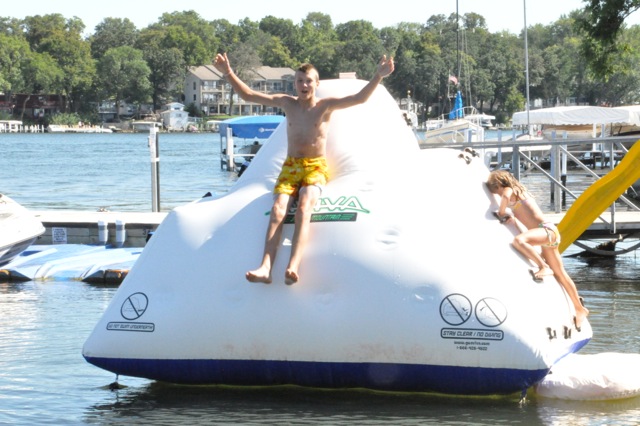 In a recent NYT column / book review about kids and summer, Julie Lythcott-Haims waxes poetic about lazy, old-school summers, while criticizing current trends to push America’s “luckiest” teenagers toward internships, college-prep classes, sports and music camps, or “maybe all of the above.” She disapproves, and asserts that summer is the perfect time for teens to “kick around doing nothing.”
In a recent NYT column / book review about kids and summer, Julie Lythcott-Haims waxes poetic about lazy, old-school summers, while criticizing current trends to push America’s “luckiest” teenagers toward internships, college-prep classes, sports and music camps, or “maybe all of the above.” She disapproves, and asserts that summer is the perfect time for teens to “kick around doing nothing.”
I couldn’t agree more. If only modern life were so simple. But it’s not.
Here in MN, where the education is pretty good, school happens at most 180 days a year. That leaves more than 50% of your days “free.” Summer brings three-plus months of…closed doors. The schools do what they can but usually fall short in music, arts, exercise, nature, and many more categories critical to maximize one’s potential.
Meanwhile, my last count found that 18 school days include standardized testing. That’s 10% of your school year—not including the dozens of days spent prepping.
Nationwide, education quality varies dramatically—from rigorous East Coast prep schools to intensely diverse city schools where priorities become safety, feeding under-nourished students, and providing classes (and translators) in myriad languages. Most of us have kids somewhere in the middle.
Engaged (“the luckiest”?) parents see the obvious voids and fill them with extracurricular activities. It’s a problem that you spin into an opportunity.
So summer becomes a time to upsize the education that public schools provide. Parents hope to find some camps and experiences—at our own (and often substantial) cost—to fill in what our schools simply don’t do.
Heck yeah, we’d all (parents too!) rather spend three months, “daydreaming in the hammock, (and) lying in the grass staring up at the clouds.” (We do still find time for that, by the way.) But frankly, we also have other things to do.
Ms. Lythcott-Haims writes from an East Coast (and possibly elite) point of view. Yep, it sounds pretty sucky—turning teenagers into over-stressed competitors fighting for future suit-and-tie jobs on Wall Street or at Merck. It’s no wonder we Midwesterners can feel inferior and play some catch-up.
But for about 90% of the American population, summer-as-success school is not reality. The St. Paul school district now sends out a food truck (three rounds a day) just to feed students in the summer—while many of their schools go year-round just to provide food and shelter (and continued attempts to close the achievement gap).
Nationwide, millions of kids can’t play little league, join a soccer team, or escape to language camp because their parents lack the funds, the transportation, or the wherewithal to make it happen. Many can’t even get to a library.
Ms. Lythcott-Haims hopes for summers when her children live free-range and,
“come home breathless and wide-eyed with adventure.” Sweet! That’s what we all long for—adults too! But FBOW, unless you take away their many screen toys, teens’ visions these days may be more wide-eyed about digital devices—the spitfire, terse communication of texts, the countless, come-hither SM “communities,” and an endless and relentless stream of content that draws them in like no distant pond can.
If it weren’t for camps, teams, and—yes—schedules, most teens (and tweens) I know would spend more time this summer online than on a swing, field, or beach. Shit yes, I’ll fight against that addictive beast.
This website preaches the gospel of balance—the goal of working hard and PLAYING hard. (Okay, playing lazy and easy too!) So in my community, we rejoice when August finally arrives, most camps and sports have stopped, and we run into neighbors on the lake or at the park with wide smiles on all faces and shouts of, “Where have you been?”
We gather old gear and pack up the car and head “Up North,” where family reunions, fishing, bonfires, and smores take on powerful—almost mystical—relevance. With any luck, our tweens and teens get to those places and feel the sweet relief of “getting away.” They bond with faraway cousins. Play Cribbage with grandparents. Go hiking, biking, fishing, and chase frogs and balls and each other.
We do this all year, actually—not just in August. Such things can happen on weekends, holiday breaks, and many of those 185 days a year when the school is closed. But yes, the balancing act gets harder every year. Because: we also want a competitive, well-rounded education. And good test scores. And ultimately, meaningful careers that pay the bills and allow freedom from financial worry plus enough slush fund for a BreakAway now and again.
Here in the heartland, most of us aren’t sure what an Admission Dean is. But we do strive for smarts and success and fruitful futures. Summer extracurriculars are a necessary part of that. So is R&R.
There are better parents out there, and I may be a demanding SOB. (Just ask my kids.) But as my Grandma used to say,
“I’m not much good at doing nothing.”
So sometimes that, too—and preferably unplugged and outside—becomes a skill we have to teach, as Ms. Lythcott-Haims asserts. Forgive us if we want it all (even if not all at once).
Maybe there’s a Big Idea here—an opportunity to merge the two extremes at a rigorous, easy-going residential camp with sunrise salutations, healthful food, fresh air, singing and drumming, laughing and shouting, silence and sitting, and teachings from wise masters about all this complicated stuff.
Zen Boot Camp, anyone? When that opportunity arises, I know my kids will be there.
Whether they like it or not.